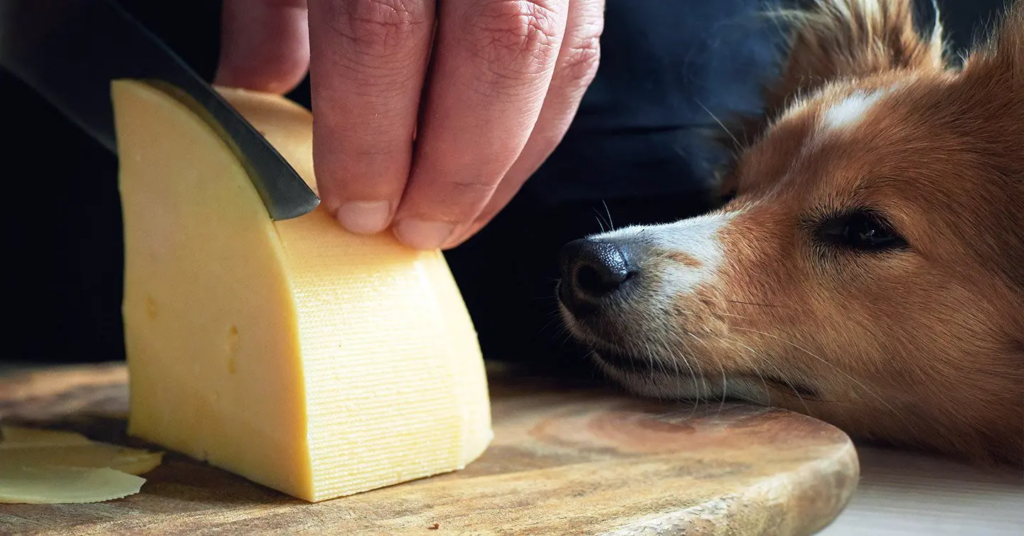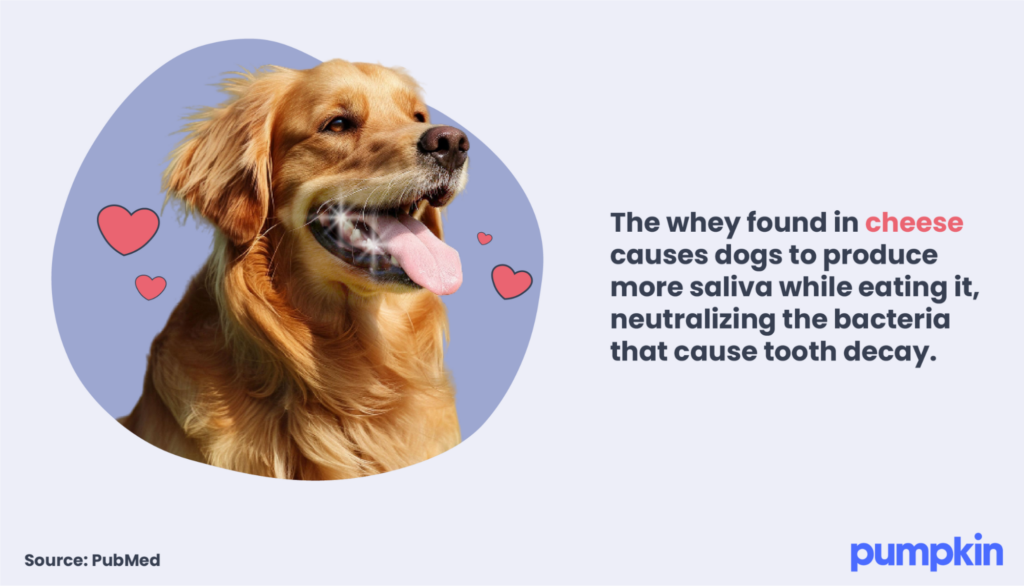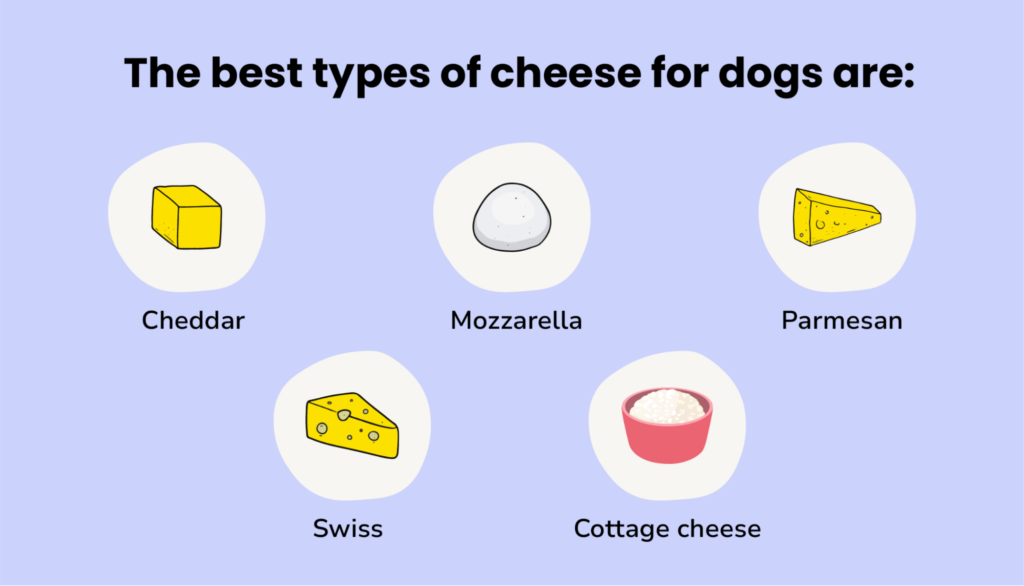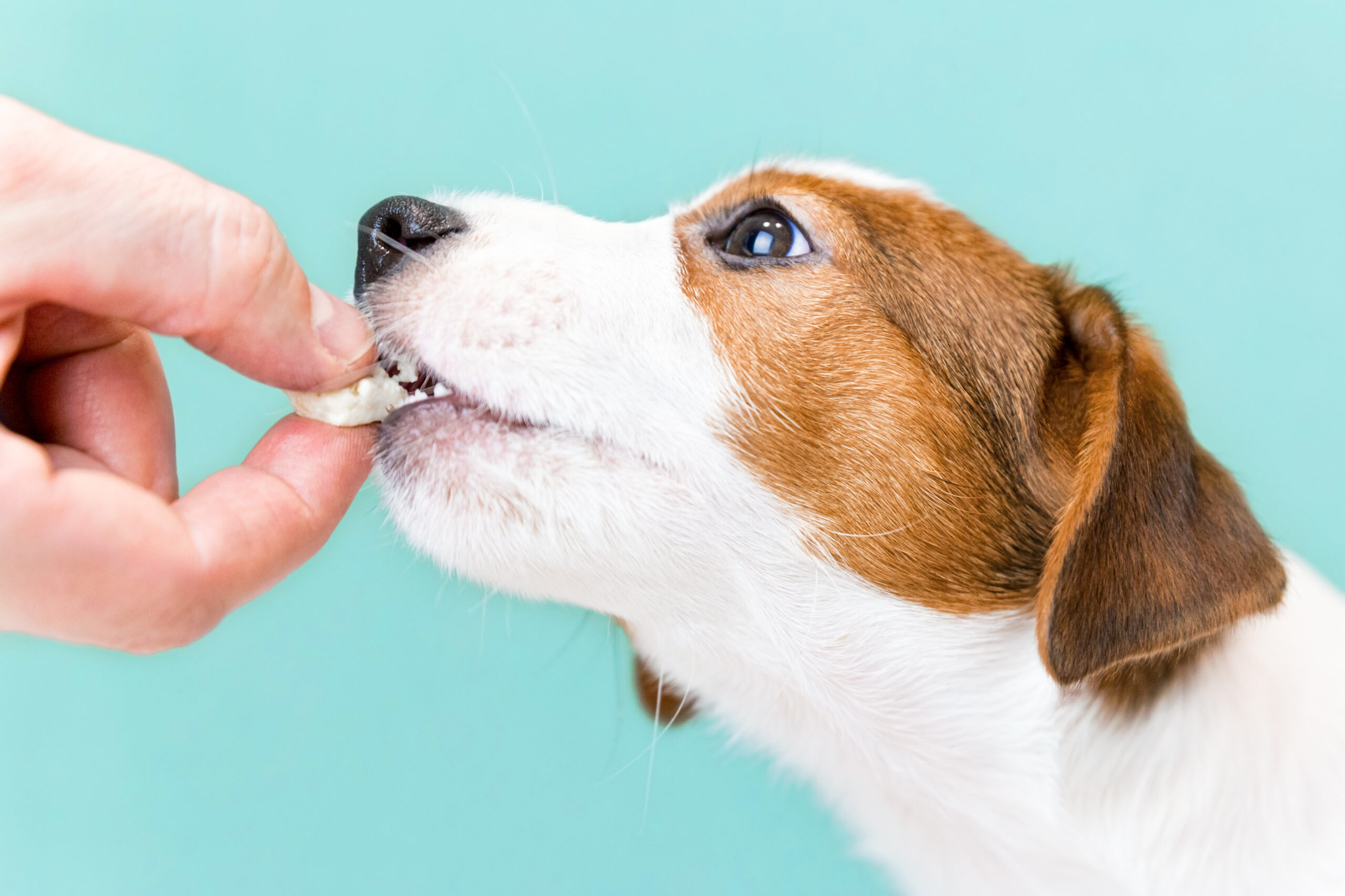Key Points:
- Yes, dogs can eat cheese in moderation, depending on their lactose tolerance.
- Cheese offers dogs a source of protein, calcium, vitamin A, and essential fatty acids.
- Avoid feeding dogs cheese with added ingredients or high fat and salt content.
There’s nothing more appealing than the smell of a warm pizza or an oozy grilled cheese. And you can be sure you’re not the only one salivating. Cheese is as irresistible to your pup as it is to you. But is it safe to share?
The simple answer is yes, which is very good news for hungry dogs. The bad news for dogs? They can’t eat the delicious pizza and grilled cheese we mentioned.
Not only can dogs eat cheese, but many pet owners make the most of this fact by using cheese as training treats, to sneak medications to their pups, and as a food topper for picky eaters. Commercial dog foods and treats even use it as an ingredient to make their food and treats more appealing.
Keep your dog safe by learning the best types of cheese for dogs, which to avoid, how much you can share, and signs that this snack isn’t right for your pup. Let’s get into it.
Nutritional value of cheese for dogs
Cheese contains high levels of calcium, protein, vitamins A, B12, zinc, phosphorus, and riboflavin. Research shows it may also contain the powerful and brain-boosting antioxidant glutathione. While these vitamins and minerals are good for you and your pup, cheese usually contains fat, cholesterol, and sodium, too. In fact, depending on the type of cheese, it may contain a lot of fat, cholesterol, and sodium.
As an example, a slice of cheddar cheese (about one ounce) contains:
- Calories: 113
- Protein: 6.41g
- Total Fat: 9.32g
- Saturated Fat: 5.29g
- Carbohydrates: 0.9g
- Calcium: 199mg
- Cholesterol: 27.7mg
- Sodium: 183mg
Because of the nutritional profile, we should only offer cheese to our dogs in moderation.
How much cheese can a dog have?
Whenever you serve a snack to your pooch, remember that treats should only comprise 10% of their daily caloric intake.
Neutered or spayed adult dogs of a healthy weight can have the following amounts of calories in the form of treats per day:
- 10-pound dogs: 20 to 27 calories
- 20-pound dogs: 33 to 40 calories
- 50-pound dogs: 70 to 90 calories
- 70-pound dogs: 90 to 105 calories
- 90-pound dogs: 110 to 135 calories
Keep these ranges in mind when portioning cheese for your pup.
Health benefits of cheese for dogs

The nutrients in cheese can provide a range of health benefits for dogs, from a shiny coat and healthy skin to strong bones and muscles. Some of the key nutrients include:
Calcium: This essential mineral builds strong bones and teeth, provides support for blood clotting, and maintains normal blood pressure in your dog’s body.
Vitamin A: This essential vitamin maintains healthy skin, a stable nervous system, and properly functioning muscles.
Vitamin B12: Your dog needs B complex vitamins to support their brain and nervous system, for the formation and maintenance of blood cells, and for a healthy digestive system.
Zinc: This mineral supports healthy skin and coat, thyroid function, and your dog’s immune system.
Phosphorus: This mineral works with calcium to shape and strengthen bones and teeth. It also works with calcium to support the growth of ligaments and tendons.
Riboflavin: This coenzyme breaks down fats, carbohydrates, and proteins to produce energy.
Glutathione: Glutathione, an antioxidant, is essential for efficient liver function. Plus, it supports your dog’s immune system and optimizes their cell health.
Omega-3 fatty acids: Found in cheeses made from 100% grass-fed cows, these are important for your dog’s brain and heart health.
Vitamin K: This vitamin is also only found in 100% grass-fed cow’s milk and is critical for normal blood clotting.

Even with all these benefits, it’s important to know that they won’t all be available to dogs that only eat small portions. And since dogs should only eat cheese in moderation, consider cheese a special treat rather than a particularly healthy snack or meal.
Risks of feeding cheese to dogs
As with all human foods, there are risks involved when feeding cheese to your dog. Keep the following warnings in mind when sharing cheese with your pup:
High fat content
The high fat content in cheese can lead to weight gain, obesity, gastroenteritis, or pancreatitis, which can be a very serious condition needing immediate veterinary care. The best bet is to offer cheese only as an occasional treat.
Lactose intolerance
Dogs often become lactose intolerant as they grow up. Puppies have to be able to drink milk, but after weaning from their mother’s milk, some will lose the ability to digest lactose. That means your dog might develop this intolerance later in life.
Signs of lactose intolerance in dogs include:
- Vomiting
- Lack of appetite
- Diarrhea
- Bloating or abdominal discomfort
- Excessive flatulence
In addition, some dogs will have an adverse reaction to milk but still be able to eat cheese and other dairy products. You won’t know for sure until they try it. Monitor your dog closely to see if they have a bad reaction to cheese.
Dairy allergies
Some dogs may be allergic to dairy products. Your vet can tell the difference between an intolerance and an allergic reaction.
Dairy allergy symptoms could include:
- Diarrhea
- Vomiting
- Nausea or lack of appetite
- Excessive itchiness around ears and licking of the paws
- Skin redness
- Hives
- Swelling of face
- Breathing difficulties
If you suspect your dog is showing food allergy symptoms from ingesting dairy, get in touch with your vet right away.
Interaction with antibiotics
Many pet owners use cheese to get their pets to take medicine, but antibiotics can become ineffective if given with dairy products. This happens because the antibiotic binds to the calcium in the cheese. Once that happens, the small intestine can’t absorb the antibiotic anymore, making it useless.
Remember: Always check with your veterinarian before putting your dog’s pills into cheese.
Which types of cheese are safe for dogs?
There are over a thousand different varieties of cheese in the world (isn’t life beautiful?), some of which are more nutritious for your pup than others. The ideal kinds of cheese for dogs are low in lactose and low in fat.
The best options are:
- Cheddar
- Mozzarella
- Parmesan
- Swiss cheese
- Cottage cheese
Safe cheeses for dogs that are also low in sodium include:
- Ricotta
- Cream cheese
- Goat cheese
- Fresh mozzarella
- Cottage cheese

The lower lactose content helps your dog avoid digestion issues, and the lower fat content helps them avoid weight gain.
Cheeses that are bad for dogs
Cheeses that contain additives, artificial coloring, high levels of sodium, or mold cultures are not safe for dogs. These cheeses can cause an upset stomach or more severe health issues like salt poisoning. Some cheeses also come with additional flavorings like garlic, onion, or chives, which are not safe for dogs to eat.
Pet parents should avoid the following types of cheeses:
- American cheese
- Blue cheese
- Roquefort
- Brie
- Camembert
- Havarti
- Feta cheese
Best ways to prepare cheese for your dog
The best way to serve cheese to your dog is to offer very small pieces. This is good for brief training sessions or as a quick reward. Remember to pay attention to how much cheese your dog eats to avoid an upset stomach.
Here’s how to prepare cheese for your dog:
- Add a bit of cheese to fresh fruit like a pineapple or apple slice
- Broccoli and cheese is a favorite combo for humans and dogs alike
- Sprinkle grated cheese on your dog’s food as an appetizing topper (a popular tip for picky eaters)
- Cut up some small pieces of cheese to use as training treats
- Add plain cream cheese to a KONG toy for a mentally stimulating snack
Natural cheeses are best, and your dog should come running when you pull them out of the fridge. Just be sure to keep your dog far away from your favorite stinky blue cheese or processed cheese product.
Dog-safe alternatives to cheese
These healthy human foods contain some of the same great nutrients you find in cheese but without the added calories or fat:
- Blueberries
- Carrots
- Broccoli
- Plain cooked chicken
- Cooked eggs
- Turkey
- Green beans
- Zucchini
- Watermelon
- Bell peppers
As always, stay within your dog’s daily calorie limit by measuring their portion before sharing.
So, can dogs have cheese?
Cheese is a snack or training treat best served in small quantities, and it can be served to good dogs guilt-free. Just watch out for the sodium and fat content, and avoid any additives, artificial flavorings, sweeteners, or mold cultures.
Moderation is especially important for small dogs or dogs with special dietary needs. When introducing any new food into your pet’s diet, always monitor them for any negative reactions or symptoms of an allergy. With cheese in particular, watch closely for signs of lactose intolerance.
Pet Pro Tip: If you have a dog that is prone to ‘snacksidents’ – you should consider getting a dog insurance plan as soon as possible. It can help you afford the best care in the future by covering eligible vet bills for digestive illnesses, toxic ingestion, and more.
FAQ
- https://www.petobesityprevention.org/pet-caloric-needs
- https://www.medicalnewstoday.com/articles/299147
- https://fdc.nal.usda.gov/fdc-app.html#/food-details/173414/nutrients
- https://www.vetmed.ucdavis.edu/sites/g/files/dgvnsk491/files/inline-files/treats-guidelines-for-dogs-2020.pdf
- https://www.ncbi.nlm.nih.gov/pmc/articles/PMC1680808/?page=1
- https://bvajournals.onlinelibrary.wiley.com/doi/10.1002/vetr.3169




